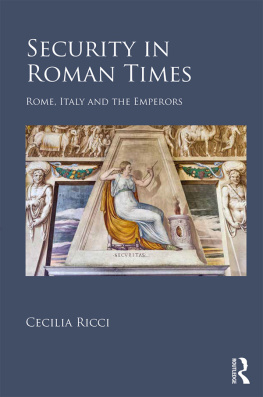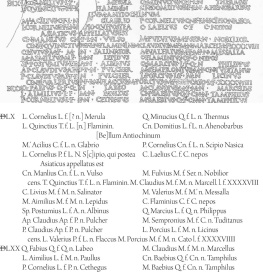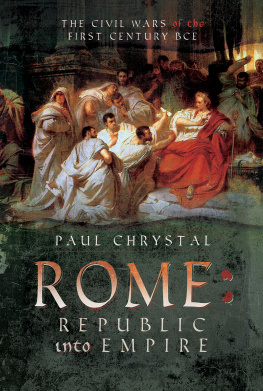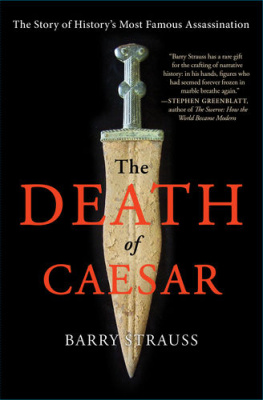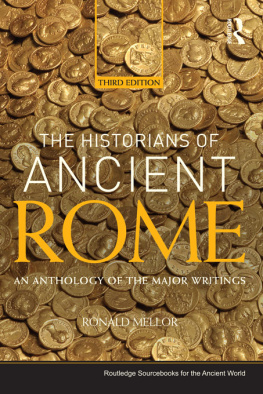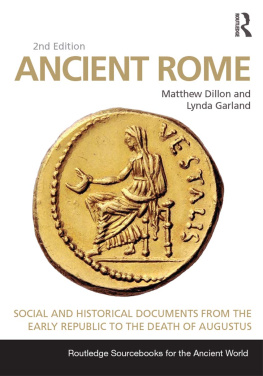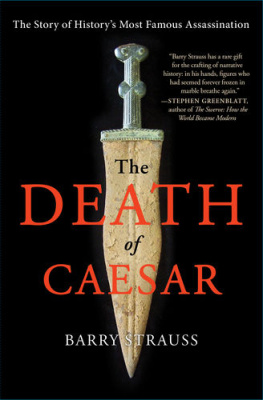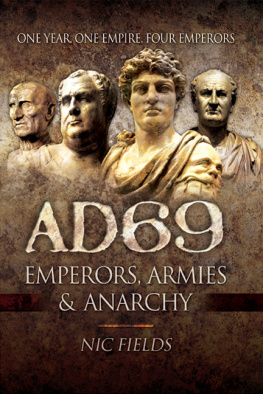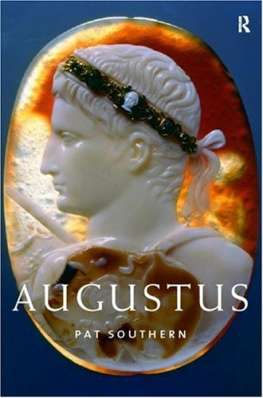p.i
Security in Roman Times
Using literary, epigraphic, numismatic and iconographic sources this book investigates the safety devices that were in place for the protection of the emperor and the city of Rome in the imperial age. In the aftermath of the civil wars Augustus continued to provide for his physical safety in the same way as in the old Republic while, at the same time, overturning the taboo of armed men in the city. During the Augustan age, the division of the city into regions and vici was designed to establish control over the urban space. Augustus successors consolidated his policy but the specific roles of the various military or paramilitary forces remain a matter for debate. Drawing on the testimony of ancient authors such as Tacitus and Suetonius and on material evidence, the volume examines both the circumstances in which these forces intervened and the strategies adopted on these occasions. It also examines the pre-Augustan, Augustan and post-Augustan meaning of securitas , both as a philosophical and a political concept. The final section expands the focus from the city of Rome to the Italian peninsula where the security of the emperor as he travelled to his country residences required advance planning and implementation.
Cecilia Ricci is Professor at the University of Molise. Her main research concerns urban troops in the first two centuries of the empire and the relationship between the military and civilians, the memory of Rome and the funeral rites of the Roman world and the presence of foreigners in the city in imperial times. She is author of a number of books, including Orbis in urbe: Fenomeni migratori nella Roma imperiale (2005), Qui non riposa. Cenotafi antichi e moderni fra memoria e rappresentazione (2006), Soldati, ex soldati e vita cittadina: lItalia romana (2010) and Venafro citt di Augusto (2015).
p.iv
First published 2018
by Routledge
2 Park Square, Milton Park, Abingdon, Oxon OX14 4RN
and by Routledge
711 Third Avenue, New York, NY 10017
Routledge is an imprint of the Taylor & Francis Group, an informa business
2018 Cecilia Ricci
The right of Cecilia Ricci to be identified as author of this work has been asserted by her in accordance with sections 77 and 78 of the Copyright, Designs and Patents Act 1988.
All rights reserved. No part of this book may be reprinted or reproduced or utilised in any form or by any electronic, mechanical, or other means, now known or hereafter invented, including photocopying and recording, or in any information storage or retrieval system, without permission in writing from the publishers.
Trademark notice : Product or corporate names may be trademarks or registered trademarks, and are used only for identification and explanation without intent to infringe.
British Library Cataloguing in Publication Data
A catalogue record for this book is available from the British Library
Library of Congress Cataloging in Publication Data
A catalog record for this title has been requested
ISBN: 978-1-472-46015-8 (hbk)
ISBN: 978-1-315-60810-5 (ebk)
Typeset in Bembo Std
by Swales & Willis Ltd, Exeter, Devon, UK
p.viii
Security is currently a highly topical issue. Even if the notion of public security, which is the product of nation states, explicitly refers to the protection, provided by the state, of persons and is a typically modern cornerstone, today the same word whether or not linked to the adjective public refers to a wide range of issues that concern, first of all, the reliability of the places where people work and live; and then the assurance of peoples safety at work and in their private lives.
In the ancient world, and particularly that of the Romans, there was not a sovereign body in charge of the security of people and places, at least not in the sense as we intend it today. However, with the conclusion of the civil wars at the end of the Republican era, a new stage begins with the Princeps who, in wanting to give a new order to the Res Publica , assumed the role (and essentially implemented the project) of guarantor of peace and safety of persons and of public places.
This book aims to investigate why and how such a plan was conceived and implemented; when; if and why it was modified or adjusted over two centuries; and whether or not, and if so, to what extent such a plan was extended to include all of Italy.
The period of time that is taken into consideration is the first two centuries of the empire, with an extension to the first three decades of the following century (the Severan age); the frame of reference is represented by the city of Rome and Italy. The reason for this choice will be made clear first, in the Introduction, and then it will be illustrated in the first two chapters.
Thus, the book is structured in the following way: in Part I, I review and comment upon studies of Roman history that, between the end of the 1960s and today, have dealt (exclusively or secondarily) with the issue of public order in Rome and in Italy. This review is preceded by an overview of those studies that can be considered, for those who have dealt with security, as reference texts, namely monographs that in the last century have investigated separately the various units of the urban troops and the paramilitary forces present in Rome in the period between Augustus and Constantine. All these works, some in a more consistent way, represent points of views that often converge on the idea of security in the Roman world. I acknowledge my debt of gratitude to many of these contributions, which represent, in this area of research, a fundamental point of reference.
p.ix
Nothing in my treatment is intended as definitive. It is likely that whoever reads these pages may be disappointed not to find cited those works that are considered well grounded and useful for the purposes of a study like this. Despite the undeniable methodological principle of completeness and continuity of bibliographic update, it is also true that the selection of books and articles that are considered is the result of a choice; and with the necessary distinctions I completely agree with what Italo Calvino writes when discussing books that each person considers critical to their education and knowledge:
The only thing that can be done is for each person to come up with its own ideal library of classics; and I would say that half the books should be the ones we have read and that have counted for us, and half are the ones we intend to read and that we assume can count; leaving a section of empty space for those books that become surprises, occasional discoveries.
In this book the word classic naturally has a different meaning, as we have just seen, because of the subject which is being treated: it refers to a reference text, which sometimes represents a positive model, other times a negative one and more often, a middle ground between the two. Some books have not been considered and are not part of this review, mainly for lack of my knowledge; or even as a result of a motivated choice (which is often, as you will see, pointed out). Other books have been included because they have counted for me; they have been a guide and an inspiration. Moreover, other books could still count and I am more than willing, after having been informed, to fill in those empty spaces with those that will prove to be unexpected surprises or occasional discoveries. If I do not pursue certain themes, it is not for lack of appreciation of their interest and importance.

